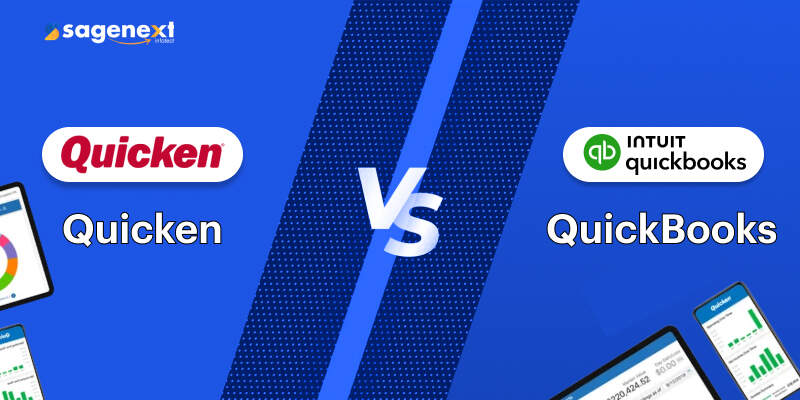
Quicken vs QuickBooks: Which Accounting Software is Right for You?
Comparing Quicken vs QuickBooks is like comparing tangerines and oranges. QuickBooks and Quicken are some of the best financial management tools many businesses and individuals use today. They were both formerly part of Intuit until Quicken was sold off to H.I.G Capital in 2016. Both tools have certain similar features, however, they also possess some differing features that are unique and designed for different purposes.
Quicken vs QuickBooks Which is Better for You
| Feature | Quicken | QuickBooks |
| Number of Users | One |
|
| App Integrations | Zero | Allows more than 650 apps including Esty, Gusto, and QuickBooks Payroll |
| Scalability | There is no option to scale with Quicken Business. If you wish to scale, you will need a better alternative. | You can easily scale with QuickBooks by moving to a higher-paying plan as your business grows. |
| Accounting Tools | Quicken has basic accounting tools for small businesses like profit and loss reports, accounts receivable, and cash flow tools. | QuickBooks offers better accounting tools for small, medium to large businesses such as inventory management, time-tracking, and tax and payroll features. You can manage payments for up to 1,000 contractors at a go and share your financial books with your bookkeeper or accountant. |
| Price | It has differing price plans based on devices.
|
It comes with four (4) price plans:
|
| Invoicing | Limited | Extensive |
Also Read: QuickBooks Online vs Desktop 2024: What is the Key Differences?
What is Quicken?
Quicken is a software application that helps individuals and families manage their personal finances. It allows you to track your income and expenses, create and manage budgets set spending goals and track your progress against them, track your investment portfolio and see how your investments are performing, and set financial goals and track your progress towards them, like retirement planning or saving for a house and pay bills pay and manage debt. Here are the strengths of Quicken
- Budgeting and Tracking: Easily create and track budgets, categorize expenses, and monitor your spending habits.
- Investment Tracking: Stay on top of your investment portfolio, including stocks, bonds, and mutual funds.
- Bill Pay and Debt Management: Manage bills electronically, schedule payments, and set up debt reduction plans.
- Retirement Planning Tools: Utilize tools to project your future financial needs and track your retirement savings progress.
- User-Friendly Interface: Quicken boasts a user-friendly interface, making it easy for beginners to navigate.
Alternative of Quicken
Quicken is one of the simple personal finance management tools out there, however, due to its inability to scale, there have been other alternatives made available.
Some of others include these:
- Mint: It has a simpler interface and better scalable features.
- PocketSmith: It offers financial tracking and budgeting features.
What is QuickBooks?
QuickBooks is a financial management tool with complete features for inventory, payroll, accounting, invoicing, budgeting, payroll processing, expense management, financial reporting, and taxation among other important features. QuickBooks has been fondly referred to as the Swiss Army knife of financial management tools.
If you run an SME and you want to track your finances and create reports about your business, QuickBooks is just the best tool for you. QuickBooks also allows you to integrate various third-party apps and 200+ add-ons that improve your financial management needs. Here are the strengths of QuickBooks:
- Invoicing and Sales Management: Create and send professional invoices, track sales, and manage customer accounts.
- Inventory Management: For businesses with physical products, QuickBooks helps track inventory levels, optimize stock, and manage purchase orders.
- Payroll Processing: Simplify payroll by calculating employee paychecks, taxes, and deductions. (Feature may require additional subscription)
- Financial Reporting: Generate insightful reports to track profitability, cash flow, and overall business performance.
- Multiple User Access: Allow multiple users to access and update financial data, ideal for collaborative teams.
Alternative of QuickBooks
Although QuickBooks comes with all the necessary features a small business needs, the cost is expensive for most small businesses. So, users look for cheaper alternatives that come with similar features.
Some alternatives to QuickBooks are:
- Xero: It has a simple and intuitive design and is mostly popular in countries outside the United States.
- FreshBooks: It is mostly used by independent freelancers and sole proprietors.
Are you looking for a QuickBooks Hosting service? Try the QuickBooks Hosting software today.
Difference Between QuickBooks vs Quicken Cost
QuickBooks allows you to pay monthly or yearly. On the other hand, Quicken doesn’t offer monthly payments so you have to pay $35.99 to $77.99 every year or $103.99 a year for its special Home and Business plan. QuickBooks provide free trial with additional features whether Quicken doesn’t come with any free trial, but there is a 30-day money-back guarantee attached to the plans.
QuickBooks might be expensive but it comes with just enough features for your small to large business needs to manage and track finances. But if your business involves owning a property, then Quicken’s Home and Business plan is suitable for you. With the plan, you can track rental and business expenses and incomes, track rents, and create tax reports for your accountant.
For a higher plan, QuickBooks also allows you to manage payrolls and inventory. This is not possible in Quicken. One key difference between QuickBooks vs Quicken when it comes to cost is how it affects the number of users using the account. QuickBooks allows multiple users based on the plans, while Quicken only allows one user.
Conclusion
Quicken is best for families, individuals, and small businesses that don’t plan to grow soon. On the other hand, QuickBooks is ideal for small, medium, and large businesses. If you’re a sole proprietor or freelancer, you might want to consider QuickBooks Self-Employed. Before choosing, it’s important to understand your financial and accounting needs.
FAQs
What is the difference between Quicken and QuickBooks?
Quicken is designed for personal finance and small businesses, focusing on budgeting, bill management, and personal investment tracking. QuickBooks, on the other hand, is tailored for small to large businesses, offering advanced accounting features like payroll, inventory management, and detailed financial reporting.
Do people still use Quicken?
Yes, people still use Quicken. It’s a popular choice for managing personal finances and small business accounting because of its user-friendly interface and features like budgeting, bill tracking, and investment management. For those interested in cloud hosting, Sagenext offers a 7-day free trial and is a top service provider.
What are the disadvantages of Quicken?
The disadvantages of Quicken include limited scalability for growing businesses, a lack of advanced accounting features compared to other software, and occasional syncing issues with bank accounts. Additionally, it is primarily designed for personal finance, which may not meet the needs of larger businesses.
Can Quicken be used for small business?
Yes, Quicken can be used for small businesses, especially those that do not plan to expand soon. It is suitable for managing basic financial tasks, such as tracking expenses, invoicing, and budgeting. However, for more advanced accounting needs, QuickBooks may be a better choice.
What is better, QuickBooks or Quicken?
- QuickBooks: Ideal for small businesses needing comprehensive accounting, invoicing, and payroll.
- Quicken: Best for personal finance management, budgeting, and tracking investments.
Can Quicken and QuickBooks work together?
No, Quicken and QuickBooks are generally not designed to work together in a direct, integrated way. They serve different purposes and use distinct data formats.






